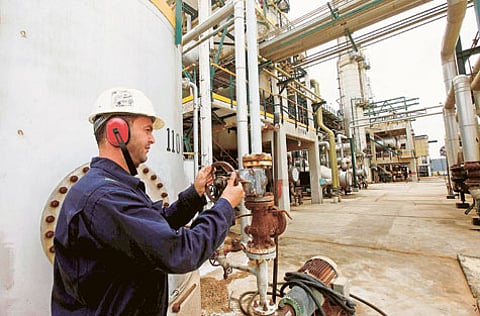Libya’s Oil output grinds to halt as Berlin peace talks conclude
The output plunge started after ports become blocked

Libya’s biggest oil field began to halt production after armed forces shut down a pipeline, compounding supply disruptions that are continuing after a conference that aimed to broker an end to the OPEC nation’s civil war concluded in Berlin.
The country’s oil production will be limited to 72,000 barrels per day once its storage tanks are full, according to a spokesman for the National Oil Corporation, down from more than 1.2 million barrels per day on Saturday. That’s the lowest level since August 2011, data compiled by Bloomberg show.
The remaining production will come from offshore fields and the Wafa oil field. The Sharara field, which can pump 300,000 barrels a day, will stop producing once its tanks are full, a person familiar with the situation said.
The output plunge started when an eastern military commander, Khalifa Haftar, blocked exports at ports under his control, according to a statement on Saturday from the state-run National Oil Corp. The NOC declared force majeure, which can allow Libya - home to Africa’s largest-proven oil reserves - to legally suspend delivery contracts.
Members of the Petroleum Facilities Guard under the command of Haftar’s Libyan National Army shut down the Hamada-Zawiya oil pipeline, forcing the NOC to limit oil production at the Sharara and El Feel fields, according to an NOC statement. The Hamada station hosts pipelines for Mellitah Oil Co. and Akakus, the operators at El Feel and Sharara respectively, it said.
“This is a policy-related disruption,” said Edward Bell, director of commodity research at Dubai-based bank Emirates NBD PJSC. “There could be a pretty quick turnaround if there’s a political solution.”
Crude Prices
Crude prices jumped in trading on Monday, but not by as much as they did after the Sept. 14 attacks on Saudi Arabian oil facilities, Bell said. Libya has less production at stake than Saudi Arabia, and its difficulties are more contained than the Saudi crisis, which threatened to escalate into a regional war, he said. Brent crude rose 23 cents on Friday to end the week at $64.85 a barrel.




